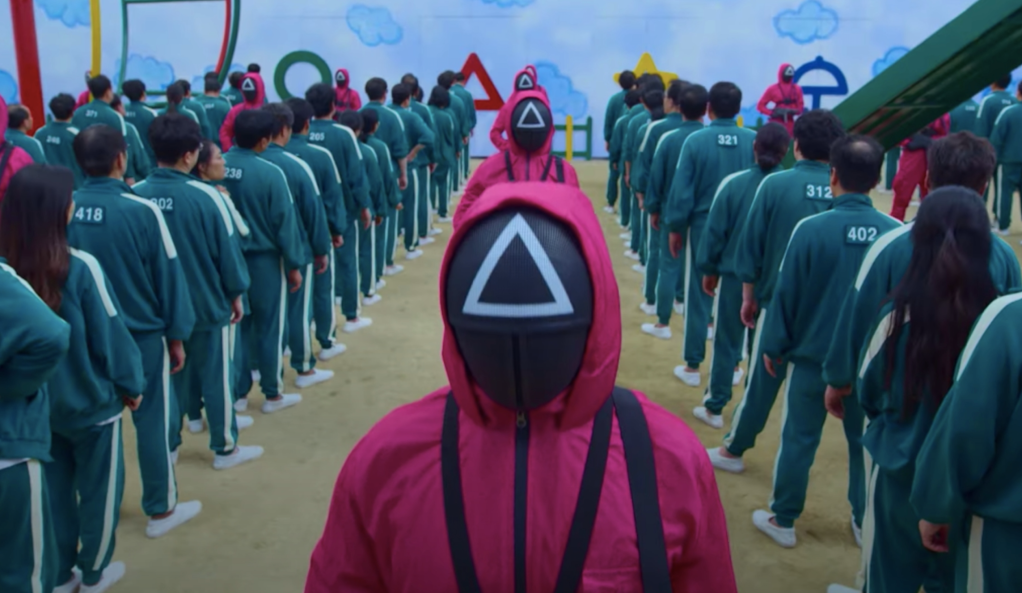TV review: ‘Squid Game’
Published 3:30 pm Wednesday, October 20, 2021

- A scene from “Squid Game.”
By now, you’ve probably at least heard about Netflix’s smash hit TV show out of South Korea, “Squid Game.” This past weekend, Saturday Night Live even featured a musical sketch with host Rami Malek and Pete Davidson highlighting the nature of the show in a fun country song. The show, like other South Korean film and television projects, is a stirring, uneasy and scathing commentary on capitalism and wealth inequality told through a kind of Willy Wonka meets “Battle Royale” story.
At only nine episodes just under an hour each, it’s ideal for binge-watching over a weekend (or in my case a day), though considering the subject matter, you may want to pace yourself.
The story follows a group of South Koreans of various ages, all plagued by debt, crime and more. They’re brought together at a secret island compound and made to play a series of six children’s games for the chance to win 45 billion South Korean won (about $39.4 million).
However, if you lose these games, you die.
All of them are there of their own volition and accept the terms of the games realizing that even though they will most likely die trying for the money, life in the real world is hell and will probably kill them anyway.
While the main stories boil down to simple survival with the characters of Senog Gi-Hun (Lee Jung-jae), Cho Sang-woo (Park Hae-soo), Kang Sae-byeok (Jung Hoyen), Ali Abdul (Anupam Tripathi) and Oh Il-nam (Oh Yeong-su), we also get a glimpse at what goes on behind the scenes of this massive deadly game courtesy of a detective searching for his missing brother (Wi Ha-Joon).
South Korean dramas seem to be able to handle these kinds of anti-capitalist social commentary subjects better than most Western studios can, taking outlandish approaches to the topics and starkly drawing connections between this hyper-violent world and our hopefully less gory one.
The violence of the show is pretty gruesome at times — viewers be warned — but it’s the overall characterizations and suspense that make it a brilliantly crafted show.
While a lot of the plot is pretty predictable, it still gets your heart pumping with the superb script and the acting. Lee Jung-jae, specifically, is top-notch.
He is able to grow this character from some super whiny, kind of despicably selfish, mostly absent father into someone who you root for through it all. Plus, his scenes as he slowly grows further apart from his childhood friend Sang-woo are subtle and captivating.
“Squid Game” is not entirely perfect, as the last episode is a bit less enticing than the rest of the series and the introduction of the “VIPs” is laughably bad (this may be a lost in translation thing though).
But those aren’t the moments that stick with you. Instead, you’re left reeling from the atrocious nature of the world that drove these characters to this game, with themes of trust, accountability and the true evils that erupt within humanity when given the opportunity and the motivation to win at all costs.
While the tone of the show overall is pretty dark and grim, this is juxtaposed with the naivete of the games themselves, and the production design the show employs.
Using a bright and happy color palette along with cutesy iconography and mixing it with this Escher-like world of never-ending, self-accepted torture of the players is pretty perfect.
While there are apparently no plans for a second season, the series is left open to more, and given the show’s meteoric popularity, it is more than likely that we’ll see another installment eventually.
“Squid Game”
Nine hour-long episodes
TV-MA
3.5 stars








